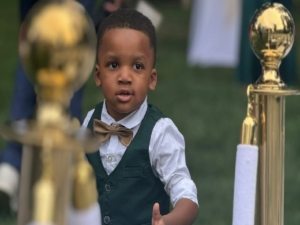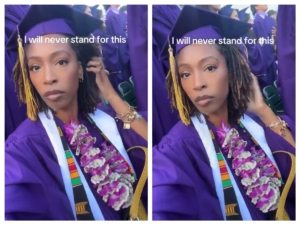LaShawn Benita Harley-Hill saw her dreams come to reality. She recently graduated from Louisiana State University in Shreveport (LSUS) with a master’s degree in counseling at the spring commencement ceremony, despite having lost her vision due to diabetes in 2017.
The crowd at Brookshire Grocery Arena gave her a standing ovation as she walked across the stage with help from Patience Davis, the access and advocacy coordinator.
Harley-Hill told LSUS, “It felt really amazing. I started to tear up many times that day, but I didn’t want to mess up my makeup. I wanted to stay pretty for my photos. It was an amazing feeling to know that all of my classmates were looking for me at graduation, and I got big hugs from classmates and LSUS staff. I got home that day, took my makeup off and just cried.”
Tears are nothing new to the 54-year-old, who said that as her eyesight gradually deteriorated to the point of complete blindness on January 17, 2017, she cried every day for a month.
“I thought, ‘God I can’t do this,” Harley-Hill said. “I can’t drive, I’ve got to depend on people – I felt like a burden. My husband Columbus told me it’s OK, it’s not the end of the world, and that people go through what they go through. Just ask God for help, and we’re going to get through this.”
The reason she can still clearly recall the date when she went blind is that it was the day following Zeta Phi Beta Sorority, Inc.’s Founder’s Day. She was an active Greek during her undergraduate student days at Morgan State University, where she received a bachelor’s degree in psychology as a sighted person.
Nonetheless, her age and blindness did not deter her. She excelled in her master’s program thanks to her extensive support system.
Two-and-a-half years ago, Harley-Hill was encouraged to go back to school by the Louisiana Association of the Blind (LAB), and Louisiana Rehabilitation Services made it possible financially through a grant.
“Toni Collins was an employment specialist, and I had talked about wanting to counsel and talk to people,” Harley-Hill recalled. “She asked about me going back to school.
“I said, ‘At my age?’ Well OK, let’s do it.”
Harley-Hill finally earned a 3.9 GPA for her degree, which included four more classes for a rehabilitation track.
Columbus, her spouse, drove her home from Bossier City after picking her up from class after hours. She used SporTran’s Liftline (now OnDemand) to commute to LSUS and her different practicum and internships, which is part of the City of Shreveport’s paratransit program.
She worked for what is now Ochsner LSU Health hospital during her slow visual impairment, so optometrist Dr. Scott Kavanaugh sent her to the LAB for assistance in restoring everyday life tasks.
She recounted, “My husband had to reorganize my clothes, my closet and our home so I’d know where everything is.” Harley-Hill has been married for nine years.
She added, “An occupational therapist came in and made sure I knew where everything is, putting bump stops on different things. I get around really well now.”
LAB provided Harley-Hill with a smart cane, a computer with software that can read to her, and technical support.
She recalled, “LSUS professors were very understanding in giving me time to complete my assignments. Email was the key for me, and they worked with me and converted everything I needed into Word. When I wrote papers, (LSUS) librarians like Abigail McCoy and Martha Dauzat would help me pull articles based on my topic.”
Since she recorded lectures for later listening, Harley-Hill remarked that her voice recorder was a lifeline.
READ ALSO: College student makes his own prosthetic legs to carry himself to graduation
Every semester, a mobility instructor assisted Harley-Hill in finding her classes on campus. Smart canes are equipped with GPS technology that helps the user navigate and recognize obstacles.
“There were times when I wanted to throw in the towel because there’s a lot going on, but I didn’t give up,” Harley-Hill admitted. “I also had a lot of strong classmates like Jakob Rogas. They texted me to make sure I was good, sometimes offering advice on how to accomplish something. Strong classmates and church members got me through it.”
Harley-Hill will formally begin her new profession as a counselor at Pelican Bayou Counseling in Shreveport soon after her practicum and internships with Louisiana Rehabilitation Services and Uprising Addiction Center.
“I’ve got great experience in working with people with everything from deafness and vision impairment to people dealing with substance abuse,” Harley-Hill said. “I can offer hope as a counselor and use my experiences to help others.
“I hope I can be an inspiration and an example of not giving up. Just because things happen in your life, don’t count yourself out. Anything is possible through faith, and you can do anything if you set your mind to it.”
Harley-Hill, who explained that diabetes runs in her family and isn’t diet-related in her case, said, “A disability doesn’t stop you from doing things, it just might slow you up a little bit.
“We can do just as much as anybody else, it might just take a little longer.”










